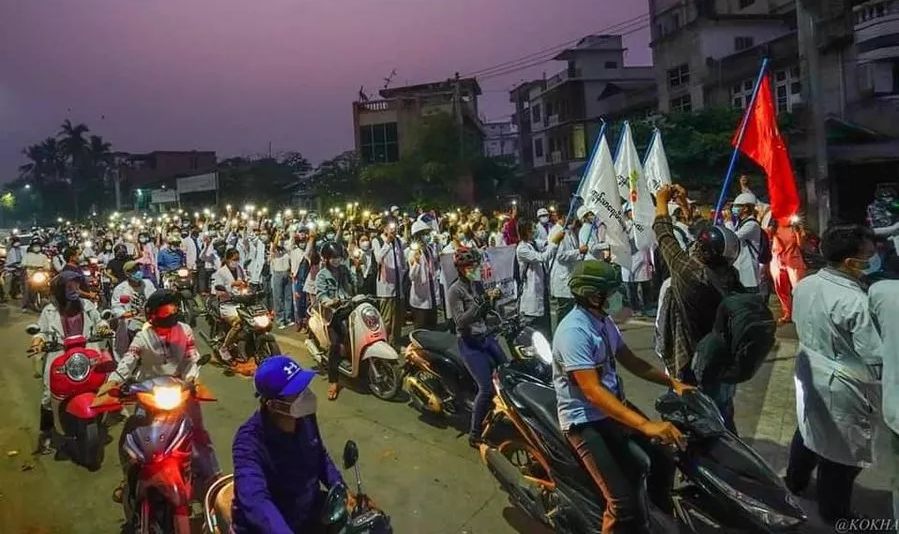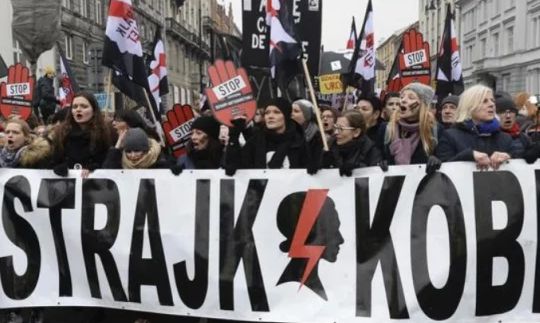Rob Jones is a member of Sotsialisticheskaya Alternativa (ISA in Russia).
Terrorist Tatmadaw massacres hundreds in Myanmar
International Socialist Alternative, with workers and youth across the world, expresses its complete disgust and anger at the horrific events in Myanmar.
On Saturday, March 27, whilst the military junta chief Min Aung Hlaing was dressed in a bow tie hosting a banquet to celebrate “Armed forces day” his soldiers were creating a bloodbath on the streets, which left 114 peaceful protesters dead. To compound the situation, on Sunday troops opened fire at mourners attending a funeral to bury the dead. The military, it seems, are prepared to go to any lengths to defend their rule, whilst the Myanmar population continue their heroic struggle to free themselves from dictatorship. As many say, Tatmadaw now hardly differs from a “terrorist organisation” and it should be disbanded.
A remarkable feature of the struggle in Myanmar in past weeks has been the unity of the various national groups in struggle, whilst the military continues to try and divide them. For decades now the many different ethnic groups have waged struggles, including armed struggles with the demand for greater autonomy. Aung San Suu Kyi was almost universally condemned when she justified the military’s attacks on the Rohingya people in 2017. Although in parts of the country there have been ceasefires, the army has again attacked peoples in the North and East. For two nights in a row over the weekend villages occupied by the Karen people were subjected to airstrikes.
Now the “General Strike Committee of Nationalities” is stepping up support for the strike wave under the demands:
- Abolish dictatorship
- Release political prisoners
- Build a Federal Democratic Union
- Abolish the 2008 constitution
In an open letter it has sent to all the ethnic armed groups including Karen National Army, Chin National Front, Arakan Army, Revolutionary Council of Shan state, National Socialist Council of Nagaland-Khaplang, it says: “It is necessary for the ethnic armed organisations to collectively protect the people”. Many interpret this as an attempt to create a new federal army to defeat Tatmadaw.
A united struggle of the various peoples against the military regime would be a tremendous step forward, and when linked to the call to “restart the strike” would mean that the epicentre of what would before have been a rural based struggle would now be urban. But there is a danger – a new, even if unified army, if it just follows a military strategy poses the danger of Myanmar simply becoming a war zone, similar to what happened in Syria after the Arab Spring.
If however genuine multi-ethnic self-defence was to be established and controlled by democratically elected committees, based on the workplaces and communities, and combined with a general strike across the country, there would be every possibility of defeating the coup.
It is the working class and the oppressed peoples of Myanmar that remain at the centre of the resistance to this bloody regime. At dawn on Friday, March 26, for example, Doctors in Mandalay launched a strike against the military junta. As our correspondent from Myanmar commented: “The dawn strike was very effective. It demonstrates that they do not support the coup in any way, that we should always be diligent, always rebellious.”
Medical workers are at the forefront of these strikes, but they have been joined over the past weeks by strikes in the transport, banking, education and textile sectors. On Wednesday, major stores across the country including City Mart, Sein Gay Har, Capital Hypermarket and Orange where workers had already been refusing to sell goods produced in factories owned by the military declared a silent strike. Overnight a hundred of the key staff were arrested in Yangon and taken for interrogation. These follow major strikes in the textile sector earlier in the month.
The situation in the textile sector is particularly difficult. The industry has grown over the past two decades as an alternative, cheaper, source than other Asian countries, including China. Although the main customers are western based multinationals such as H&M, TopShop and Gap, almost all companies are owned either by the military linked Myanmar Economic Holdings Public Company Ltd (MEHL) and Myanmar Economic Corporation Ltd (MEC), or are joint enterprises mainly with Hong Kong based companies.
For several years Human Rights Groups have been arguing for sanctions against the Myanmar military, in particular since the massacre of the Rohingyas. Western governments and companies have refused. Only now because of the outright anger globally at the massacre have limited sanctions been agreed against MEHL and MEC. Limited, because the interests of Western oil companies such as Chevron, which has a joint enterprise with the Myanmar government have not been touched.
Nor have attempts to impose an embargo on the sale of arms to the military had much success. China, Russia, India and Israel have continued to supply ships, armoured vehicles, fighter aircraft and missiles. It is Russian and Chinese supplied fighter aircraft that have been used in airstrikes over the weekend against people, mainly from the Karen minority massing at the border with Thailand.
Alexander Fomin, Russia’s Deputy Defence Minister attended Saturday’s military celebrations, declaring the Kremlin’s support for the military in a move that has been interpreted as an attempt by Tatmadaw to counterbalance the influence of China. It is quite understandable and correct that the masses of Myanmar hate these two authoritarian regimes seeing them as complicit in the brutal clampdown.
This has led to a wave of attacks on Chinese owned factories. Over thirty plants, part of global supply chains have been subject to arson attacks. Attacks on Chinese companies have been at the cost of workers. In at least one case over thirty workers died in the fire that destroyed their workplace. While the Tatmadaw are quick to lay the blame at the door of protesters, the circumstances are unclear. Chinese capitalists are particularly hated by workers for their role in collaborating with the military authorities to break the strike movement. They have informed on strike leaders, dismissed strikers and in one case locked 1,000 workers inside the factory to prevent them joining the protests. Until now textile workers have played a key role in the struggle, and in general the mood is one of people united against the military. It cannot even be excluded that it is the military itself behind some of the attacks to justify imposing martial law in industrial zones, and in an attempt to push China into more open support. The Chinese regime says the arsons are inspired by the West, but all these governments are guilty of abusing workers in Myanmar through raw exploitation and support for repression.
Leading brands including H&M, Zara, Primark, Tesco, Tchibo and Next have all signed a statement together with the IndustriALL global trade union demonstrating their concern at the situation in Myanmar. “As businesses,” they say, “we are committed to fully respecting human rights and labour rights in our operations and supply chains, in particular, the right to freedom of peaceful assembly, freedom of opinion, and freedom of association under the Universal Declaration of Human Rights.”
The reality and hypocrisy behind such statements however is shown by the actions of companies such as H&M who have temporarily paused placing new orders. This is due, it says “to practical difficulties and an unpredictable situation limiting our ability to operate in the country, including challenges related to manufacturing and infrastructure, raw material imports and transport of finished goods.”
In 2017, it was factories producing for H&M that found themselves at the centre of violent labour disputes, initially over unpaid overtime and healthcare. These disputes also revealed the anti-working class nature of the Aung San Suu Kyi government. H&M has since argued that it cannot “unilaterally” raise the wages paid by its suppliers as it shares production with other brands – but its whole business model is based on exploiting the workers in Myanmar who have a minimum wage of about 72 euros a month, and usually work a six day week.
The approach of unions such as IndustriALL, in effect collaborating with those businesses who are making big profits from their cooperation with those Chinese companies that exploit Myanmar workers, will not only not bring any long term benefits, but stands in stark contrast to what international class solidarity actually means. The only effective means of putting pressure on such regimes is trade union boycotts of companies who trade with Myanmar’s military – the blacking by Genoa dock workers of an arms shipment for the war in Yemen a year ago was a brilliant example of this. In the same way the Burma Federation of Trade Unions has sent solidarity support to workers at the Amazon warehouse at the center of an historic unionisation drive in Bessemer Alabama in the US, in return trade union campaigners in Alabama have sent their support to workers in Myanmar.
The struggle has reached a turning point with last weekend’s brutal attacks by the military. But if the campaign is to be stepped up, there should be no going back to the previous order. As many demand, the 2008 constitution should be abolished. This should also mean rejecting the misleadership of ASSK and the NLD who failed to transform the country and who’s only alternative is that of submission to Western multinationals. This needs the convening of a revolutionary assembly to form a workers’ and poor peoples’ government of all ethnicities as part of a genuinely democratic and voluntary federation of Myanmar and South-East Asia.
There should be no compromise with the military — as a first step, the resources and assets of the MEHL and MEC should be taken into social ownership and run by democratic workers committees. At the same time, the country’s natural resources should also be taken into public ownership and a democratic plan established to end poverty and need for all, including all ethnic groups. Only in this way will it be possible to establish a genuine federation, in which all ethnic groups have the right to self-determination.
In sending its greetings to the heroic struggle of the Myanmar people, ISA believes the way forward is around the following demands:
- No return to a compromise with the military or capital. Release all political prisoners
- Reject the 2008 constitution. Support voluntary federation and the right of self determination for ethnic minorities.
- Disband the Tatmadaw. Bring the generals to justice. For a democratically controlled people’s defence force.
- For a democratically organised struggle and self-defence based on the striking workers, the youth and oppressed minorities.
- End exploitation by the military and multinationals. For public ownership of industry and natural resources. For democratic planning to end poverty and need.
- For a revolutionary assembly to form a workers’ and poor peoples’ government of all ethnicities as part of a genuinely democratic and voluntary federation of Myanmar and South-East Asia.




